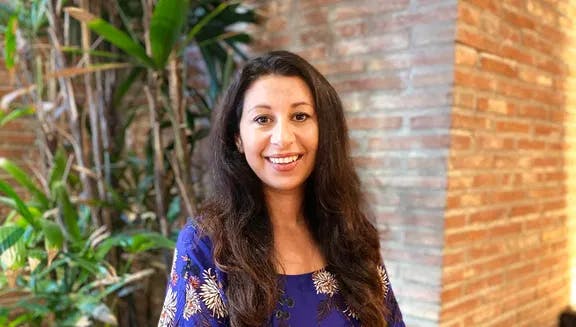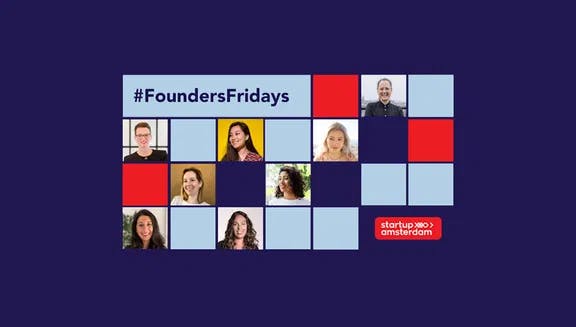#FoundersFridays: Meet Kirsty Sharman

#FoundersFridays is a StartupAmsterdam interview series: for entrepreneurs, by entrepreneurs. Each hero answers questions on their entrepreneurial journey, their learnings, milestones and bottlenecks, as well as on Amsterdam and the Dutch startup scene. It’s a platform for entrepreneurs to speak their minds freely and pass on their learnings to anyone who’s thinking about founding a startup as well.
This week we spoke to Kirsty Sharman, the founder of Referral Factory, a SaaS solution that offers startups, scaleups, and SMEs to create their referral campaigns or use one of their ready-to-use templates. Kirsty is a serial entrepreneur from South Africa that started her third and latest venture in Amsterdam. We're happy to share her entrepreneurial story with you.
How did your career journey lead you to found Referral Factory?
I’ve been in advertising for over a decade, and have always found myself building products or services that help customers find smart ways to grow. My first business sold YouTube ads (helping brands get discovered on YouTube), my second venture was an Influencer Marketplace (helping brands get discovered through influencers), and my third business—Referral Factory—is currently helping brands get discovered through their own customers, by making it easy to ask their customers to refer friends.
I decided to move to Amsterdam after my second venture, and look for the next trend in marketing.
What I learned was that the growth channel that performed best—hands down—was simply asking your current customers to spread the word for you, and offering them a reward for referring new customers. It was also clear that people were flocking off the feed and into private chats and groups, so I saw a real opportunity to tap into the power of word of mouth. Over the next two years, I custom-built 12 referral programs for clients looking to grow, and the results blew me away every time!
I started to obsess over understanding why every business in the world didn’t have a referral program - and it became clear that launching a referral program was just too complicated and expensive for most businesses. You needed a developer to code the referral software from scratch each time, and so the setup costs were high. It blew my mind that such a powerful marketing channel wasn’t accessible to every business - so I decided to change that by building an easy-to-use referral solution.
Referral Factory was built at the end of 2019 and launched out of beta in January 2021. Since then, we’ve helped hundreds of businesses launch powerful referral programs, and collectively they’ve generated over 40 000 referrals for our customers. I always tell people that we didn’t invent referral programs—tech unicorns like Uber, Paypal, and Dropbox pioneered the concept—we just made it easier for any business to have one by providing an affordable, plug-and-play solution.
What makes Amsterdam a great city and a great ecosystem for a startup founder?
My view on Amsterdam’s startup ecosystem is based mainly on my experience of moving from a third world to a first world market. I was looking for a place where innovation was valued because I knew surrounding myself with great thinkers would be essential to my own insight and development.
In my initial research, the other option I considered was Berlin, but I found the language barrier to be too much of a challenge. So, I’d say that Amsterdam is a great city for startups because it’s so accessible to English speakers; I knew that I needed to hit the ground running as a foreign entrepreneur. I just saw that the Netherlands had topped the English Proficiency Index again. It’s not all about accessibility, though—encouraging English proficiency also means that Amsterdam is an incredibly diverse place. It’s a cosmopolitan city that values internationalism. And with that diversity comes a range of different views, problems, and approaches. This mix of cultures and experiences creates a melting pot for innovation.
I’ve also been impressed with the support for startups in Amsterdam with places like StartupAmsterdam and TNW. There is also a host of great events and networking opportunities—pre-covid of course—and great access to capital, which is what largely drives the growth in the ecosystem. In 2019 Dutch-based startups raised a whopping €4.5B!
Important for me too is that the Netherlands creates a lot of support for women in tech. I was fortunate enough to be invited to participate in the EQUALS initiative, for example, which has made space not only for my own self-development but has also given me the opportunity to meet a younger generation of women wanting to work in the tech industry.
I do also have to say, though, that there are still some challenges for startups in Amsterdam. One of the biggest for me has been the access to tech talent in the city because it houses so many big startups (Uber, Booking.com, etc). This creates a competitive market that could lead you to bid higher and higher for talent. For entrepreneurs starting out, this initial cost for hiring can be too high, especially when you’re bootstrapping. I’ve managed to get around that problem by hiring a remote team, which has been both an asset and a challenge in itself.
Bootstrapping - how to do it successfully? When to look for investors?
I have a pretty strong view on this subject. My sense is that the media and other key players in the field tend to over-glorify capital raises, and so, many entrepreneurs tend to think that either they can’t start without capital or that if their startups aren’t gaining traction it’s because they don’t have enough capital.
It’s not at all that I think raising capital is bad, of course, it can be an incredible tool to drive growth—rather, I think we need to stop making out as if raising capital is the only option and, rather, educate entrepreneurs about the pros and cons, about what capital can do for you and when and where you should look to access it.
When I started the Referral Factory journey, I figured that I could either spend six months to a year raising capital on the basis of an idea, or the same amount of time generating the capital I needed by consulting and working two jobs. I chose the latter and decided to bootstrap. It wasn’t at all easy, it meant that myself and the team were all working at least two jobs in the first six months to make ends meet - but if you can do it, it has its benefits...
First, it meant that we’ve retained large ownership of the company. Raising capital too early often means that you give away a much larger portion of the company. Bootstrapping also meant that we had proof of concept far earlier than if we’d raised capital at the beginning. By the time we decided to double down and do a seed raise, we already had over one hundred paying customers, so the risk for investors was lower and we could negotiate better terms. Post-revenue, we managed to raise a seed round of €300k in three weeks. And, because we were already generating revenue, we also didn’t need to raise as much capital. We decided to raise just enough to help us get to €1 million ARR.
However, I also know that the option to bootstrap Referral Factory was enabled by the nature of the industry. In ad-tech, the initial costs are far lower than say in bio- or fin-tech. So, for me, it’s really about education so that younger entrepreneurs can make informed decisions and not just chase capital because they see it as the only route to startup success. I believe that—if possible—entrepreneurs should try bootstrap for as long as they can, and once they have product-market fit, then seek capital to accelerate growth.
Being a solo founder or finding a co-founder? What are the opportunities/ challenges in the path that you chose?
I won’t lie… I've found the journey as a solo founder to be taxing at times. Growing a business includes such a wide range of complex tasks, so you’re almost always in uncharted water. Having a co-founder whose skills and expertise complement your own can really help to mitigate risk and uncertainty. And, with risk comes responsibility, not only for yourself but also for the people you’re hiring along the way. I’m fortunate enough to understand both product and marketing, and that has helped me find great people who are just as passionate about what we’re doing as I am, and to be honest much better in their niche than I could ever be! I’m incredibly grateful for Alex, Jess, Zee, Camilla, Lena, and Sviat who all started out freelancing and have since moved into full-time roles.
Nonetheless, I think that sometimes entrepreneurs focus too much on things that can be changed at a later stage: logos, pricing models—and find co-founders. It’s impossible to get it all right at the beginning of your venture. So my advice is just to get started, even if you’re starting out solo. Get your product into the market. Try to get paying customers. If you focus on this, you’ll be more likely to succeed. And when you do, you’ll have room to change things, like bringing on a co-founder if you need one.
What are the goals and needs of Referral Factory for 2022?
Having just completed our seed round, we’re now looking to ramp up growth in 2022—this means building out our marketing team to acquire more customers, and continuously improving our product so we can retain these customers for years to come. We currently only offer a SaaS solution, which targets SMEs and Startups, but we also have an enterprise solution in the pipeline, which should be out of beta by July 2022.
We’re looking to grow our ARR from €300k to €1m in 2022, which should come from a mix of new customers and existing customers upgrading as they get more use from our platform. Our pricing is designed in a way that when our customers win, we win, which helps keep our focus on delivering the best referral solution to our customers.
Once we approach the €1m goals, we’ll likely look to raise a Series A, which will help us to open operations in the USA and build the team needed to service our enterprise solution.
Want to learn more about the women breaking through the startup scene? Check out this roundup of Amsterdam’s wonder women.
Related articles

#FoundersFridays: Meet Nancy Shenouda

#FoundersFridays: Meet Nelli Jeloudar

#FoundersFridays: Meet Maxime ten Brinke

#FoundersFridays: Meet Emily Huberts

#FoundersFridays: Meet Tim van Alphen

#FoundersFridays: Meet Svetlana Kordumova

8 #FoundersFridays Female Entrepreneurs celebrate March 8th

#FoundersFridays: Meet Ling Lin

#FoundersFridays: Meet Aly Buydoon
